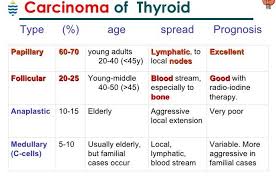The thyroid is a small gland located below the voice box in the front of the neck. It is made up of two lobes and is shaped like a butterfly. As part of your endocrine system, this gland makes hormones that affect your heart rate, temperature, mental function, and metabolism.
If cells in the thyroid gland grow uncontrollably, they form a nodule (tumor). Most (90 percent) of thyroid nodules are benign (noncancerous). But 1 out of 10 are malignant (cancerous).
Approximately 62,500 people are diagnosed with thyroid cancer in the United States each year. The disease usually affects people between the ages of 20 and 55. Women are nearly three times more likely than men to develop thyroid cancer.
Types of Thyroid Cancer
The disease can be hard to catch at first because many thyroid tumors don’t cause symptoms.
Many people with thyroid cancer don’t have any signs or symptoms of the disease.
Some notice small, painless lumps or swellings called nodules in the front of the neck.
Other symptoms can include:
- hoarseness
- trouble swallowing
- breathing problems
- pain in the throat or neck that doesn’t go away
- a cough that doesn’t go away
A risk factor for thyroid cancer is a condition, behavior, or other part of your life that increases the likelihood of developing the disease.
It’s important to understand what risk factors you have for developing thyroid cancer so that your doctors can decide which treatment approach will be most effective for you.
The different types of thyroid cancer have different risk factors.
Risk factors for papillary thyroid cancer include:
- Radiation exposure. People who were exposed to radiation when they were children have a higher chance of developing papillary thyroid cancer.
- Inherited conditions. People with a family history of multiple colon growths because of inherited conditions may be at an increased risk for papillary thyroid cancer. An example of this is familial adenomatous polyposis.
- Family history. For about 5 percent of people who develop papillary thyroid cancer, the disease runs in the family. Researchers are still trying to figure our which gene is to blame.
- Gender. It’s unclear why, but papillary thyroid cancer occurs about three times more often in women than in men. When it does happen in men, it usually grows and spreads more quickly.
Risk factors for follicular thyroid cancer include:
- A low-iodine diet. People are more likely to develop follicular carcinoma if they live in a place where iodine isn’t added to salt that’s used in food.
- Familial conditions. Inherited disorders, such as Werner’s syndrome and Cowden’s syndrome, sometimes include thyroid cancer as part of the disease process.
Risk factors for medullary thyroid cancer (MTC):
- Family history. Approximately 25 percent of people with MTC have inherited a mutation in a gene called RET.
Information about your health and family medical history can help in figuring out your risk for thyroid cancer. This information is important for building a treatment plan that makes sense for you.
